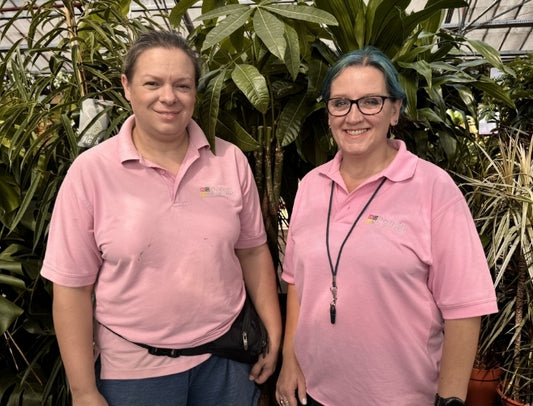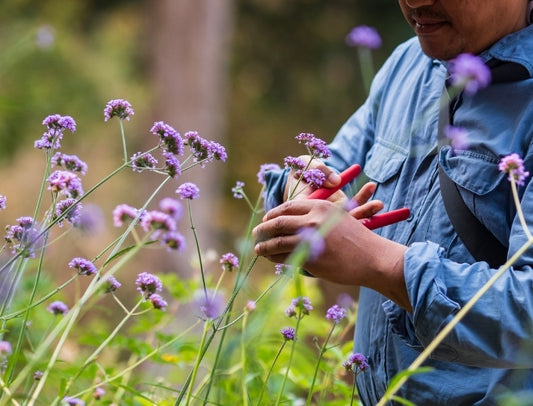
This approach covers everything from the way we manage resources to how we source products and support biodiversity. Our policy reflects the shared values of the garden centre industry and responds to growing expectations from customers who want to shop responsibly.
Peat Free & Growing Media
Peatlands are essential for carbon storage and biodiversity, so reducing peat use is a priority. We stock a wide range of peat-free composts and soil conditioners, making it easier for customers to garden without harming these fragile habitats. Our team is trained to explain the benefits of peat-free gardening and to recommend suitable alternatives. While some specialist products still contain peat, these are clearly identified and sourced with care. Our long-term goal is to phase out peat entirely and encourage gardeners to embrace sustainable soil choices.
Waste, Recycling & Packaging
We take a proactive approach to waste management. Cardboard is collected for recycling, plastic plant trays are reused where possible, and single-use plastics are reduced across the business. Packaging in our gift and homeware ranges is carefully reviewed, with recyclable or compostable options preferred. We also work with suppliers to cut excess packaging and reuse materials where possible.
In addition, we are part of the WEEE (Waste Electrical and Electronic Equipment) takeback scheme, which ensures unwanted electrical items are collected and recycled responsibly. This reduces landfill waste, supports the recovery of valuable materials, and minimises environmental impact, giving customers a simple way to dispose of electrical products sustainably.
Water Conservation
Responsible water use is an important part of our policy. Water butts collect and store water for irrigation, reducing reliance on mains supply. Irrigation systems are regularly maintained to prevent leaks and waste and watering is scheduled at times of the day when evaporation is lowest. These practices not only reduce our environmental footprint but also demonstrate to customers how water can be managed efficiently in the garden. We actively promote water-saving ideas such as using water butts, mulching soil and planting drought-tolerant species.
Renewable Energy & Carbon Reduction
We are committed to lowering our carbon emissions through smarter energy use. Across the site, lighting has been upgraded to energy-efficient LEDs, which reduce consumption while providing excellent brightness for displays. We have introduced electric vehicle charging points in our car park to make it easier for customers and staff to choose greener travel options. By tracking energy use and investing in sustainable solutions, we are building a long-term strategy to reduce our reliance on fossil fuels and support national carbon reduction targets.
Sustainable Sourcing & Local Supply
The products we sell reflect our values, which is why sourcing is carefully considered. Where possible we partner with UK growers and suppliers to reduce transport distances and support local communities. Timber products are always sourced from FSC-certified suppliers, guaranteeing sustainable forestry practices.
We favour suppliers that reduce packaging, use recycled materials and show clear environmental responsibility in their operations. By making careful choices at the sourcing stage, we can offer customers products that are high quality, ethically produced and environmentally sound.
Wildlife & Ecosystem Support
Our responsibility to the environment includes supporting local wildlife and ecosystems. We select plant varieties that provide nectar and pollen for pollinators and encourage customers to choose options that create habitats in their own gardens, with in-store guidance available. We also maintain the forest ground around our site by managing leaf fall, controlling invasive species, and supporting native plants, creating a balanced habitat for birds, insects, and small mammals. This work helps protect biodiversity and ensures the land remains sustainable for future generations.
Staff Knowledge & Support
Our team plays an important role in putting our environmental commitments into practice. Many of our staff have built up strong knowledge of plants, gardening, and sustainability through years of hands-on experience. This practical background allows them to share advice with customers on topics such as peat-free growing, recycling options, water saving and wildlife-friendly planting. We encourage staff to stay informed about new products and environmental developments so that they can continue offering useful guidance. By drawing on their knowledge and experience, we ensure that sustainability is part of the everyday conversations we have with customers.
Customer Engagement
Sustainability works best when customers are supported to make informed choices. In store we provide clear signage and information that highlights sustainable products such as peat-free compost and pollinator-friendly plants. Our staff are always available to answer questions and share practical advice on topics like recycling and water saving, helping customers apply these ideas in their own gardens. We also welcome feedback, as it often sparks new ways to improve our approach. By engaging with customers directly, we create a shared commitment to protecting the environment.
Continuous Review & Improvement
Our environmental policy is designed to evolve as new opportunities, technologies and best practices emerge. Each year we review progress across all areas, from waste and recycling to energy use and biodiversity support. This allows us to identify where we can improve and to set realistic goals for the future. We also remain engaged with industry developments, ensuring that our policy reflects the latest thinking in sustainable horticulture. By treating environmental responsibility as a journey rather than a destination, we remain committed to continuous improvement.








